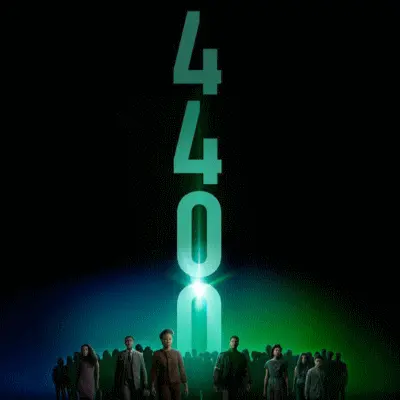The CW's 4400 is yet another remake that fails to capture the spirit of the original
-

"When a beloved franchise is rebooted, the risks almost always outweigh the rewards. This is especially true for a television series," says Terry Terones. "For every Battlestar Galactica and One Day at a Time there are 10 Magnum P.I.s and Knight Riders, with the latter reimagined twice and each version failing spectacularly. Despite most reboots having a history of success only acceptable for a Major League hitter, The CW is wading into the waters with another franchise near and dear to many: 4400. The original series, titled The 4400, debuted on the USA Network in 2004 and ran for four seasons. It had pedestrian ratings but was a critical success and acquired a cult following, with fans viewing the series as a mix of The X-Files and The Twilight Zone. The cast was also loaded, with Peter Coyote, Billy Campbell, Garret Dillahunt, Summer Glau, and future Academy Award winner Mahershala Ali playing pivotal roles. A 14-year gap between the first series and the latest iteration provided producers with a chance to put their mark on the franchise, which they’ve certainly done in the pilot (the only episode available for review)." Terones adds: "While at first glance 4400 has potential, there are several red flags that should make viewers proceed with caution. The dialogue is clunky, with some lines bordering on parody, particularly for any character from a time period more than 20 years in the past. There are dubious plot choices, starting with how the 4400 quickly learn from a guard what year it is. Amazingly, they take the news relatively well, which is quite strange. The apparent antagonist in this series, the government officials quarantining the group, seem to be understaffed and disorganized. While that last point might be realistic, it also illustrates the show’s overall ramshackle and dated feel. Somewhat ironically, 4400 feels like it was made in 2004, with characters quickly pigeonholed into specific archetypes and a plot that’s easy to poke holes through.The pilot is disjointed, which will remind hardcore fans of one of the original series’ most nagging issues."
ALSO:
- 4400 shed the "The" and picked up a lightness of touch that feels breezy and fresh: "In its CW incarnation, 4400 promises drama without heaviness, and the pilot sets up various story points without feeling too portentous," says Daniel D'Addario. "One plotline concerns the government response, with a social worker (Joseph David-Jones) and corrections officer (Ireon Roach) working together in the midst of a government response we increasingly see as punitive. Elsewhere, Shanice (Brittany Adebumola), who was ripped away from her husband and daughter in the early 2000s, finds that they’ve moved on, and grown up, without her. Elsewhere, the dislocation of disappearance and reappearance seems to have lent special powers. Claudette (Jaye Ladymore) experiments with her seeming ability to heal instantly. The pilot pushes up against certain limits: Its budget strains when trying to convey the scope of the reappeared, all of whom are supposedly being sequestered together by the government. (It might have been easier to call this show 'The 44.') And the show’s hand with the historical-fiction sketches it produces can feel unsteady: Characters from the more distant past can, in 4400’s first installment, feel more like broadly drawn types than like people for whom we are meant to feel. The first of these, viewers on the show’s wavelength can likely get past; the second, the show likely will. The pilot’s culture-clash elements don’t consistently work, but there are glimmers of moments in which characters from different historical eras work together to figure out the mess they’re in; if 4400 leans into its curiosity about what relationships between these characters can look like, and not just how they might needle each other, it will be on to something."
- 4400 brings out the corniness of the premise by putting everybody in the same room: "It also takes far too long for everyone to realize they're in a different time period, a goofy beat that could have been more impactful if the show had more faith in its characters," says Nick Allen, adding: "In spite of its earnest ideas however tacky execution, 4400 is not about grace or subtlety when it comes to these its history or drama. That’s not a bad thing itself, but more that the show is constantly trying to force its air of importance, whether it’s the big twists that come every five minutes, or the whole big question that the series uses as the reason to keep watching. There’s little room for characters from other eras to introduce themselves as more than figures who seem to have picked from a history museum’s reenactment cast."
- How 4400 producers aimed to differentiate itself from USA's The 4400: “This is really a character show, and that’s what we really think is going to bring people in — that’s what brought me into the original, honestly. I really loved those characters; I really cared about their journey on top of the sci-fi thing that happened to them that was incidental,” says co-showrunner Ariana Jackson. “People have to figure out how to survive and will have to figure out how to move forward, and to us, that’s the interesting thing.”
TOPICS: 4400, The CW, The 4400, Ariana Jackson
More 4400 on Primetimer:- TV Today: Ali Wong Spices Up Valentine's Day and The Bachelor Tugs at Some Heartstrings
- TV Today: Summer House Leaves COVID Behind, Michelle Obama Sits Down with BET
- Former The 4400 star Patrick John Flueger to guest on The CW's 4400 revival series
- TV Today: The CW Reboots 4400, All American Returns, and Ed Sheeran Joins The Voice
